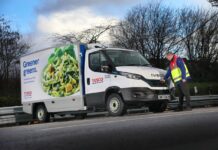From 21 May 2022, anyone wanting to operate a light goods vehicle between 2.5 and 3.5 tons for hire and reward in any EU member State – including the Republic of Ireland – will be required to have a UK Licence for the Community if they want to use their vehicles.
The move is part of an EU wide change in the legislation covering operator licences, but it only applies to EU member states. Vans and other light goods vehicles which operate only within the UK will not be affected, nor will vehicles used as part of someone’s work, for example vans used by plumbers, electricians, or other tradespeople to transport themselves and their tools.
 To ensure that the necessary legislation is made in time, the Department for Infrastructure is working closely with the Department for Transport and DVSA in the production of a single piece of legislation which will make the changes on a UK-wide basis.
To ensure that the necessary legislation is made in time, the Department for Infrastructure is working closely with the Department for Transport and DVSA in the production of a single piece of legislation which will make the changes on a UK-wide basis.
Why are the rules changing?
The EU adopted what is known as Mobility Package 1 in 2017, with the aim of tightening up the rules around the carriage of goods for hire and reward generally, by removing factors undermining fair competition between resident and non-resident operators and address shortcomings around how the rules were applied and enforced. The final elements of the mobility package will become law in all EU member states on 21 May 2022.
What will this mean for NI light goods vehicle owners?
If they don’t operate in the EU (including the Republic of Ireland) then they won’t have to do anything. The domestic Northern Ireland rules aren’t changing, nor are the equivalent rules in Great Britain. However, if they operate a light goods vehicle in the EU, they may have to take some action.
How will someone know whether they need to act?
The new requirement applies only to vehicles carrying goods for hire or reward for someone else. So, if you carry your own produce, for instance, you won’t be affected. If you carry tools as part of your business, you won’t be affected. However, if someone pays you to carry something for them, whether it’s from Lurgan to Lisnabreen, or from Letterkenny to Laragh, you will have to have an operator’s licence.
What will this mean for those who’ve never had an operators’ licence before?
New operators will have to apply for a licence. The requirements are essentially the same as for operators of heavy goods vehicles, with some relaxations around financial requirements and operating centres.
 For example, the financial standing requirement is £1600 pounds for the first LGV and £800 for each subsequent vehicle. And though applicants will have to have an operating centre, where their records are kept, this will not have the stringent parking requirements of an HGV operating centre.
For example, the financial standing requirement is £1600 pounds for the first LGV and £800 for each subsequent vehicle. And though applicants will have to have an operating centre, where their records are kept, this will not have the stringent parking requirements of an HGV operating centre.
Applicants will have to meet the competency requirements, which could mean obtaining the necessary qualifications or contracting the services of a transport manager. For anyone who has been operating an in-scope vehicle for more than 10 years, there will be an ‘Acquired Rights’ process to enable them to be exempted from the competence requirements for up to three years, during which time they will need to either get qualified or find a qualified transport manager. The application process for acquired rights will be opened as soon as the online process is finalised, and dates will be released as soon as they are confirmed. Applicants will need to provide evidence that they have a 10 year history of work which equates to the functions of a transport manager.
What if someone uses LGV’s in the EU and they’ve already got an operator’s licence?
For a person or company which already possesses a goods vehicle operator’s licence, the licence will need to be varied to include the light goods vehicles.
When is this happening?
The EU requirement will kick in on 21 May 2022. The Department is working with the Department for Transport and the Driver and Vehicle Services Agency (DVSA) to set up the necessary webpages and application processes. However, for legal reasons it’s not possible to take applications until the legislation is laid in parliament, which should be around the end of November, so the dates on which the application websites will open will be announced as soon as they are confirmed.
What should LGV operators do now?
They should watch out for further information from the Department and, if they know of anyone who may be affected, they should also make them aware. Anyone who feels that their own business may be within the scope of the new provisions should take steps to find out more about the requirements.
More information can be found at ‘New rules for international road haulage in 2022 | Department for Infrastructure (www.infrastructure-ni.gov.uk),’ which includes a link to an email alert service.












